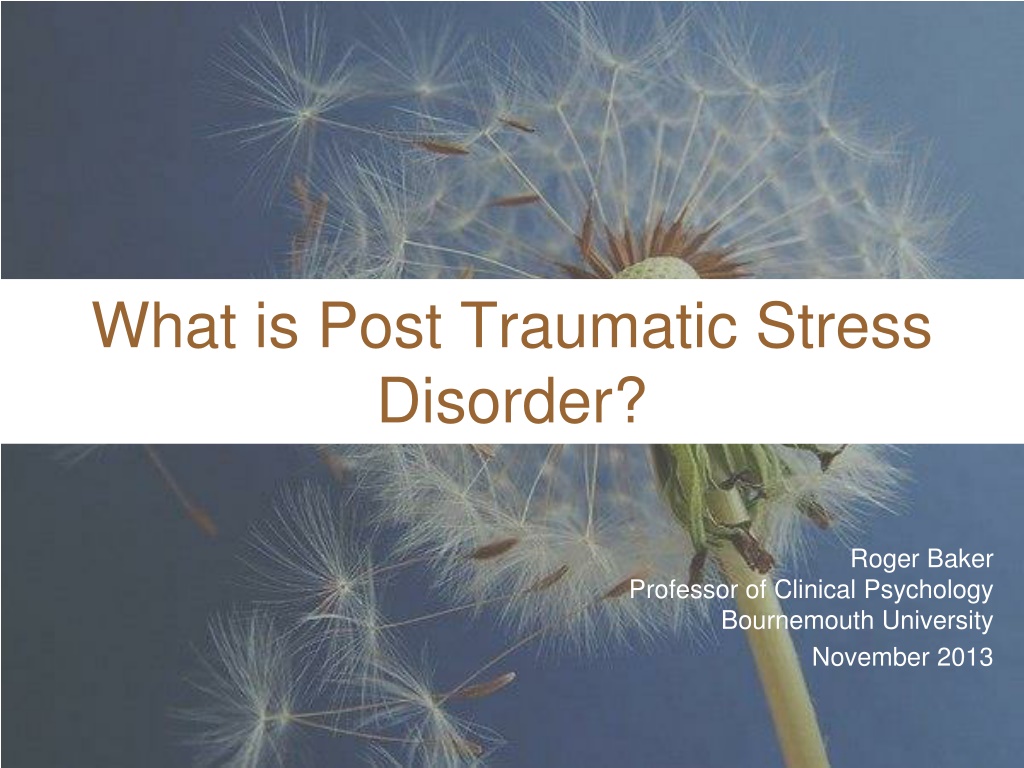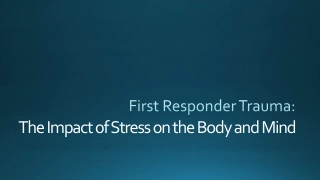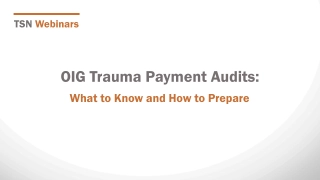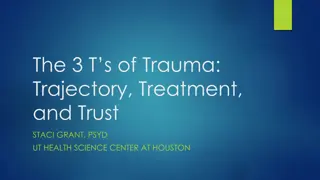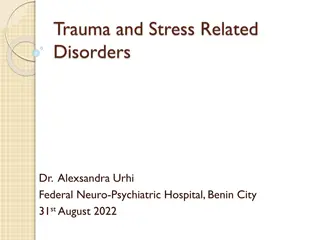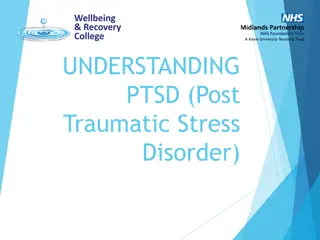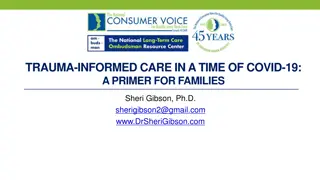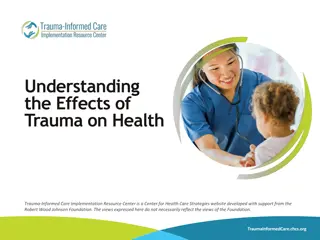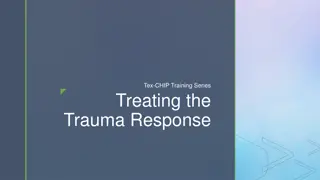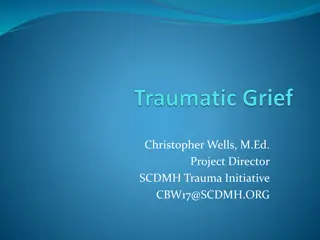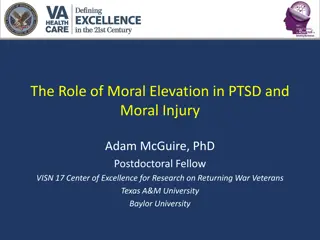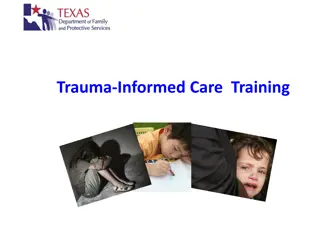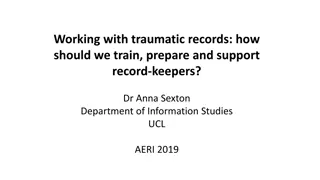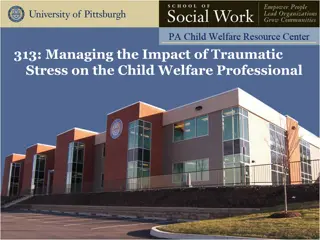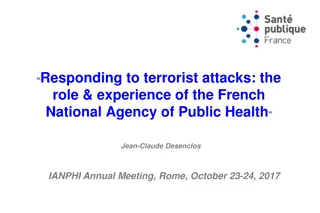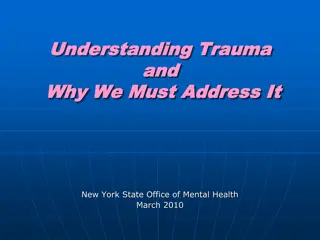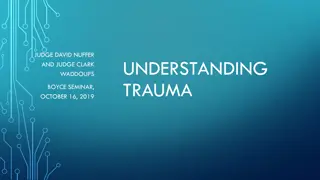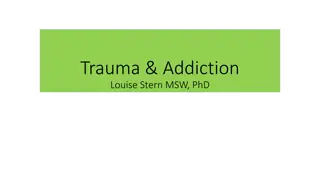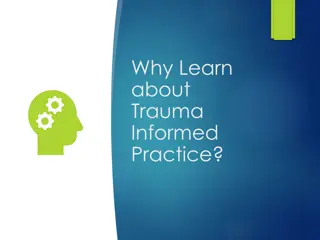Understanding Post-Traumatic Stress Disorder (PTSD) and Trauma
Post-Traumatic Stress Disorder (PTSD) is a psychological condition that may develop after a person experiences a traumatic event. Trauma can result from various incidents such as accidents, natural disasters, abuse, or war, leading to personal reactions and challenges in one's perceptions. Victims often question their sense of safety, worldview, and self-worth. This condition requires understanding, compassion, and support for recovery. Recommended readings include "Man's Search for Meaning" by Viktor Frankl, "I Can't Get Over It" by Aphrodite Matsakis, and "A Grace Disguised" by Jerry Sittser.
Download Presentation

Please find below an Image/Link to download the presentation.
The content on the website is provided AS IS for your information and personal use only. It may not be sold, licensed, or shared on other websites without obtaining consent from the author. Download presentation by click this link. If you encounter any issues during the download, it is possible that the publisher has removed the file from their server.
E N D
Presentation Transcript
What is Post Traumatic Stress Disorder? Roger Baker Professor of Clinical Psychology Bournemouth University November 2013
What is a trauma? 1. Personal accidents e.g. car crash 2. Large scale accidents e.g. King s Cross station fire 3. Intentional disasters e.g. 9/11 attacks 4. National disaster e.g. experiencing a tsunami 5. Personality inflicted crimes e.g. mugging 6. Sexual abuse e.g. in childhood, marital abuse or rape 7. Illness-related e.g. diagnosis of cancer 8. Wartime conflict e.g. war in Afghanistan 9. Long term or repeated trauma e.g. genocide in Sudan
Why me? Victims are forced to reconsider at least 3 assumptions about themselves and the world: That they are personally invulnerable; It can t happen to me That the world is orderly and meaningful; But it did happen and I no longer feel safe That they are good and strong people; What did I do to deserve this? It s not fair .
Man s Search for Meaning by Viktor Frankl I can t get over it by Aphrodite Matsakis A Grace Disguised by Jerry Sittser
Why me? The Aftermath of a Road Accident I remember those first moments after the accident as if everything was happening in slow motion. They are frozen into my memory with a terrible vividness In the hours that followed, the initial shock gave way to an unspeakable agony. I felt dizzy with grief s vertigo, cut off from family and friends, tormented by the loss, nauseous with pain I could not stop crying. I could not silence the deafening nose of crunching metal, screaming sirens, and wailing children. I could not rid my eyes of the vision of violence, of shattering glass and shattered bodies. All I wanted was to be dead.
Experiences of a Concentration Camp Survivor Three phases of the inmate s mental reactions to camp life became apparent; the symptom that characterises the first phase is shock. The illusions some of still had were destroyed one by one, and then, quite unexpectedly, most of us were overcome by a grim sense of humour. Apart from that , another sensation seized us: curiosity. Cold curiosity predominated even in Auschwitz, somehow detaching the mind from its surroundings. At that time one cultivated this state of mind as a means of protection
These reactions began to change in a few days. The prisoner passed from the first to the second stage; the phase of relative apathy, in which he achieved a kind of emotional death. By means of this insensibility the prisoner soon surrounded himself with a very necessary protective shell. Reality dimmed, and all efforts and emotions were centred on one task; preserving one s own life and that of the other fellow.
In the third phase the release of the prisoner everything appeared unreal, as in a dream. We had lost the ability to feel and had to relearn it slowly. Many days passed, until not only the tongue was loosened, but something within oneself as well; then feeling suddenly broke through the strange fetters which had restrained it Apart from the moral deformity, there were two other fundamental experiences that threatened to damage the character of the liberated prisoner: bitterness and disillusionment. Victor Frankl, A Man s Search for Meaning
I pointed to the roll of paper in the inner pocket of my coat and said, Look, this is the manuscript of a scientific book. I must keep it at all costs. It contains my life s work . The reaction showed me the plain truth and did what marked the first phase of my psychological reaction: I struck out my whole former life. The odds of surviving the camp were no more than 1 in 28. It did not seem possible that the manuscript would ever be rescued. I had to undergo and overcome the loss of my mental child and now it seemed that nothing and no one would survive me. So I found myself confronted with the question whether, under such circumstances, my life was ultimately void of any meaning.
I did not know that the answer was already in store for me. When I surrendered my own clothes I was given the worn-out rags of an inmate who had already been sent to the gas chambers on his arrival at Auschwitz station. Instead of the many pages of my manuscript I found in the pocket of the coat a single page torn out of the Hebrew prayer book, containing the most important Jewish prayer, Shema Yisrael. How should I have interpreted such a coincidence other than as a challenge to live my thoughts instead of merely putting them on paper? Victor Frankl
Diagnostic criteria for PTSD The person has been exposed to a traumatic event in which both of the following were present: The person experienced, witnessed or was confronted with an event or events that involved actual or threatened death or serious injury or a threat to the physical integrity of self or others The person s response involved intense fear, helplessness or horror Duration of the disturbance is more than one month The disturbance causes clinically significant distress or impairment in social, occupational or other important areas of functioning
.diagnostic criteria for PTSD The traumatic event is persistently re-experienced in one (or more) of the following ways: Recurrent and intrusive distressing recollections of the event, including images, thoughts or perceptions Recurrent distressing dreams of the event Acting or feeling as if the traumatic event were recurring (includes a sense of reliving the experience, illusions, hallucinations and dissociative flashback episodes) Intense psychological distress at exposure to internal or external cues that symbolise or resemble an aspect of the traumatic event Physiological reactivity on exposure to internal or external cues that symbolize or resemble an aspect of the traumatic event
.diagnostic criteria for PTSD Persistent avoidance of stimuli associated with the trauma and numbing of general responsiveness as indicated by three (or more) of the following: Efforts to avoid thoughts, feelings or conversations associated with the trauma Efforts to avoid activities, places or people that arouse recollections of the trauma Inability to recall an important aspect of the trauma
.diagnostic criteria for PTSD Markedly diminished interest or participation in significant activities Feeling of detachment or estrangement from others Restricted range of affect (eg unable to have loving feelings) Sense of a foreshortened future (eg does not expect to have a career, marriage, children or a normal life span)
.diagnostic criteria for PTSD Persistent symptoms of increased arousal (not present before the trauma) as indicated by two (or more) of the following: Difficulty falling or staying asleep Irritability or outbursts of anger Difficulty concentrating Hypervigilance Exaggerated startle response
Four psychological mechanisms Mechanism 1: Re-experiencing the event
Four psychological mechanisms Mechanism 1: Re-experiencing the event Flashbacks I suddenly see the face of the intruder Nightmares In my dream the cancer had returned and I was on the operating table having both breasts removed. The surgeons were trying to cut deeper and deeper saying we can t get it all out . My children stood around the operating table crying Sense of reliving the trauma, e.g. prisoners of war suddenly feeling they were back in captivity Intense psychological distress to trigger stimuli, hearing squealing tyres brings back the distress of the accident. Intense physiological distress to trigger stimuli, e.g. Chemo infusion, it s just a certain red... Even to think about that sort of red makes me feel... It brings back all the sick feeling and makes me feel a bit shaky .
Four psychological mechanisms Mechanism 2: Persistent increased arousal
Four psychological mechanisms Mechanism 2: Persistent increased arousal Difficulty falling or staying asleep Irritability, e.g. my fuse is much shorter. John (her husband) will make a joke and I jump down his throat Difficulty concentrating Hypervigilance Exaggerated startle response
Four psychological mechanisms Mechanism 3: Emotional numbing
Four psychological mechanisms Mechanism 3: Emotional numbing Lack of interest in important activities I have lost in socialising and in material things. I don t go shopping as much as and would rather stay at home where I feel safer Restricted ability to experience feelings all feelings ceased to be, at least on the surface, because one could not exist and at the same time live with such feelings of abhorrence, disgust and terror Feeling of detachment or estrangement from others My body feels much as if my head and body were separate. It s almost as if I am out of the room. I can hear your questions but they feel like they are at a distance
Four psychological mechanisms Mechanism 4: refers to a style of handling emotions Avoidance
Four psychological mechanisms Mechanism 4: refers to a style of handling emotions Avoidance Avoiding thoughts, feelings or conversation associated with the trauma Avoiding activities , places or people that arouse recollections of the trauma.
NICE recommends Prolonged Exposure for adults in a safe environment. (National Institute of Clinical Excellence (2005) Post Traumatic Stress Disorder (PTSD) : The management of PTSD in adults and children in primary and secondary care. Clinical Guidance 26. March 2005.)
Like behavioural exposure for obsessions and phobias, exposure for the PTSD sufferer means facing the memories of the trauma.
Susan Post Traumatic Growth
